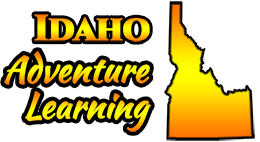Don't Forget to Share the WHY
Submitted by Cheryl Werhner on Fri, 2017-07-14 00:00
Curriculum can bog me down sometimes. I can get so involved in the knowledge that kids need to know, that I forget to share the WHY. This week has been a big refresher in the concept of why we need to take kids outside and show them what’s going on in their world. This week we got dirty, sweaty, drove all over the Treasure Valley, ate lots of good food, and went adventuring. I absolutely learn better when we “go and see”.
Integrating what I know about socio-ecological systems into my classroom might come in several packages. First, I might take small groups of kids “out” to learn from the agencies, and presenters that I learned from this week. Second, I might use the activities that I learned about this week to provide a more hands on experience for my students, and lastly, I feel invigorated, knowledgeable, and more passionate about the watershed that I live in.
WHY do you think learning about your socio-ecological systems in the Boise watershed is important?

Comments
All About the Why
I often have the same problem where I get so caught up in covering the what that I forget to cover the why with my students. Students are always more interested in what we have to say when we make it pertinent to their own lives outside of school. Hearing about all the people who came to speak to you all this week has really inspired me to look into getting more guest speakers into my school. If kids learn the importance of getting outside and learning about their environment they may be more passionate about protecting it.
I think you've hit the nail
I think you've hit the nail on the head, I know I need to start sharing the "why" a lot more with my students. I want to go deeper with my students' learning and let go of the idea that every detail needs to be covered. In the long run students will benefit from a deeper understanding of a few concepts rather than a bunch of surface level details. I think lessons centered around socio-ecological systems is a great way to make learning relevant and go deeper. Students need to understand that our environment thrives when the different systems within it are in balance, and as humans we are a part of that system; not a seperate entity. Teaching students that the Boise Watershed is quite literally all around us and showing them how heavily we all relie on this system can drive home that point. I would love for my students to role play various scenarios that could effect our watershed so they can think through the many facets that are impacted. Scenarios could be a drought year, a heavy snow year, increase in food demand, decrease in farmland/increase in urban development, population boom, extinction of a native species, toxic spill, damn breach etc. etc. Students could brainstorm the possible outcomes and present them to one another. It is a high level thinking activity that would get them going deeper with the learning while making it relevant to their lives. This is our city, this is our home, but it wouldn't be possible without the watershed.
Why and what could be.
A big part of ecosystems is balance. Not only of how everything is but what it could be as well. I really love you mentioned how important it is to share the why. Why are we studying this. Why should this be important to me? Why do my actions matter? Why do we even need to make changes? As we share the why with students they can then gain an appreciation for their own environment. They can realize that they do make an impact as they enjoy their unique Idaho lifestyle.